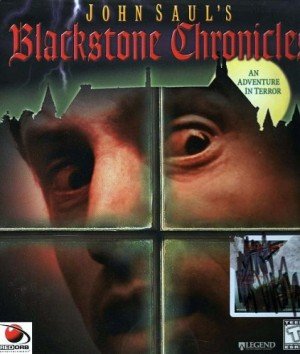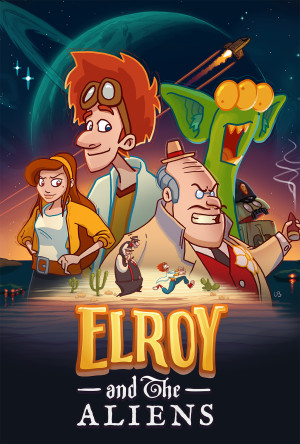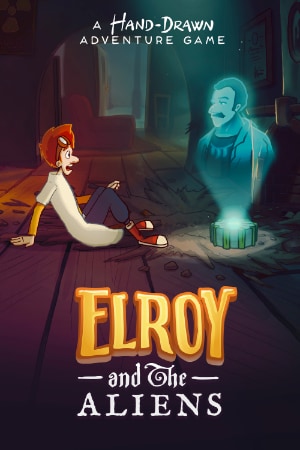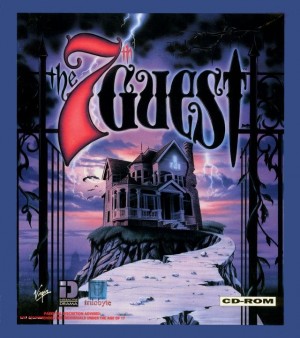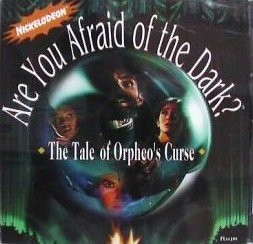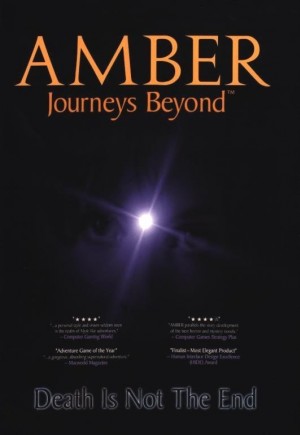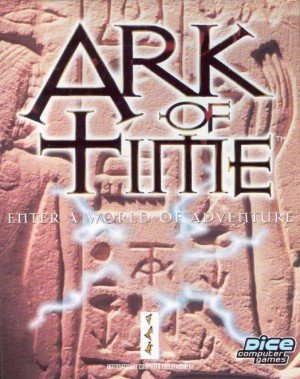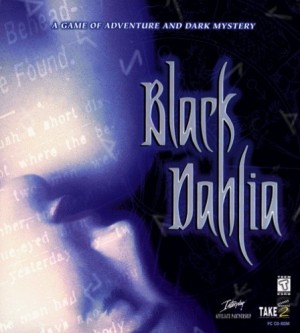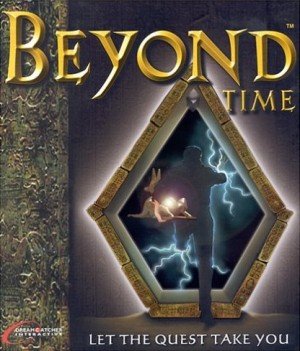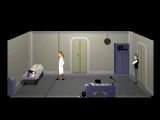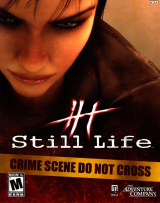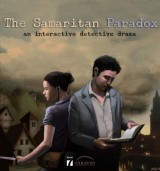Review for Blackstone Chronicles
"An adventure in terror."
That's the tag line for John Saul's Blackstone Chronicles, and for once there's truth in advertising. Yes, indeed, the game is a modern-day thriller involving an old, abandoned mansion haunted by ghosts, with a plot driven by a deranged, diabolical villain and his insatiable desire for vengeance.
The catch is... that isn't the terrifying part. There is no observable violence, bloodshed, or gore. There are no nightmarish spectres or cheap scare tactics. The horror in Blackstone Chronicles is purely psychological--only ever implied, and 100% human. It's subtle, clever, and insidious, and though it's less frightening than it is disturbing, the more you invest yourself in the narrative, the more alarmed you'll become. This will take some explaining, but for anyone not afraid to step outside their emotional comfort zone, the short version is that this game is an overlooked revelation among adventures.
Developed by the vastly-underrated Legend Entertainment and released in 1998, Blackstone Chronicles picks up several years after the serialized stories of John Saul left off. The continuity of the main characters from the books to the game is certainly a benefit for those who have experienced both, and there are quite a few references to previous events. Rest assured, however, that knowledge of the backstory is certainly not required to enjoy the game.
Blackstone Chronicles takes place entirely in a former hospital for the mentally ill, and centers around three generations of the Metcalf family. Closed for almost 40 years, the asylum is on the verge of being re-opened as a Museum of Psychiatric History. Unfortunately, this has the added effect of "awakening" the hospital's final superintendent, Malcolm Metcalf, who just so happens to be dead. What's worse is that Malcolm is fiercely territorial, and considers the asylum to represent his life's work in psychiatric care. Displeased that his adult son Oliver has rejected following in his footsteps, Malcolm kidnaps his grandson, Joshua, either as ransom to coerce Oliver to submit to his wishes, or to train as his own protégé if Oliver cannot find him before dawn.
Played from a first-person perspective, we assume the role of Oliver when gameplay begins. The central premise is to explore the museum in search of Josh. Sounds simple enough, but of course much of the building is locked, and though we quickly discover the master key ring, there are so many of them that clues are required to identify the keys we need to proceed. Yes, it's still the conventional find-the-key ploy, but at least it feels a little different, so bonus points for the twist.
The main sources of information are the museum exhibit terminals and the former residents of the asylum... Right, they're dead, too. In fact, you don't meet any actual "people" in Blackstone Chronicles. The ghosts you encounter can't even be seen, so you'll deal with them only verbally. They aren't there to haunt you, however, and you soon discover it's they that are haunted. Once you begin interacting with these spirits and reading about the asylum's history, you'll realize that the true heart of the game is delving into the experiences of those who suffered through the torturous treatments of the asylum, in the name of mental "health care."
Even as the museum proudly proclaims the asylum's operative years (1925-1959) as "the most exciting era in the history of psychiatric care", your exploring reveals horrors the exhibits do not. As you learn more about the "progressive" techniques used to treat such illnesses as Alzheimer's, schizophrenia, nervous breakdowns, and even simple depression, you can't help but start to feel uncomfortable. When you hear the patients' first-hand stories of the pain, dread, and misery they all experienced at the hands of the doctors and orderlies, it'll be gut-check time. (If your heart doesn't bleed for the little boy who liked to play with dolls, you clearly don't have a heart). And when you finally lay eyes on the actual instruments of treatment, it won't be long until you're kissing the ground beneath you and thanking all that is holy that you were born when you were. If you think I'm exaggerating, then you need to see for yourself such actual devices as the electroshock chair, the enclosed, coffin-like heat chamber, or the fever therapy device where patients were cut open and bled, to name but a few. An adventure in terror, indeed.
Of course there's far more to Blackstone Chronicles than its dark, intense atmosphere and story, but make no mistake--these are the dominant strengths of the game, leaving a lasting impression long after you've finished. In terms of actual gameplay, there are far fewer surprises. The game uses a tried-and-true interface with point & click, node-movement control. Inventory and main menu options are but a mere click away. Even adventure novices will have no need to crack the manual. There are no pixel hunts, no mazes, and no frustrating twiddleware extending the gameplay. Add to that a flawless stability on systems from Windows 95 to XP, and this game is as user-friendly as they come.
There are several timed sequences, but they are expertly handled. While most games' timed elements seem tacked on as a blatant attempt to add a little action to an otherwise sedate experience, the timed events in Blackstone Chronicles are so skillfully integrated that it's hard to imagine the game without them. Listening to a resident's tale of woe is one thing, but controlling Oliver while his heartrate audibly races in panic while Malcolm taunts your resistance is quite another, and it's incredibly effective. The horrors of the asylum simply wouldn't be complete unless you had some personal exposure to them. If that's not enough to sell you, then be assured that these are puzzles, not issues of dexterity. You'll have more than enough time to escape, and if you should free yourself the first time through, don't be surprised to find you're replaying the scene and deliberately dying, just to absorb the full effect of the moment. It's deliciously sadistic stuff. But get this! If you do fail the first time through, not only does the game allow you to restore immediately to the beginning of the sequence, it also offers you an optional hint for what you need to do or the complete solution. There is simply no better way to offer the best of both worlds. Design genius, that. It's touches like this that show how much better Legend understood gamers than the vast majority of developers.
Speaking of puzzles, Blackstone Chronicles is fairly light in that department. Some may be disappointed in that, and it must have been tempting to play up the notion of the madman's wacky schemes, as other games have done. However, bizarre enigmas really wouldn't have suited Malcolm's character, as outsmarting Oliver is never his goal so much as making him understand fear and suffering (which he does oh-so-well). As a result, many of the game's challenges are straightforward inventory tasks with logical, practical application. There are a few more complicated puzzles later on that require piecing together clues from multiple sources, but overall, these are the exception rather than the rule. While a little more puzzle variety might have been nice, personally I found the lighter and more organic puzzle focus to serve the narrative quite nicely. Any artificial dilemmas would have really shattered the atmosphere the game was working so hard to create.
Graphically, what's here is of decent quality. Unfortunately, there just plain isn't enough here, even compared to its contemporaries. The pre-rendered backgrounds all crisply display the asylum, from the lavishly-decorated, posh private rooms (occupied by the elite nutjobs) to the dark, dank, gritty "therapy" rooms of untold horrors in the basement. However, with no visible characters and extremely little animation, the game world looks utterly empty. Compounding this is the fact that there are absolutely no cutscenes in the game at all. I understand that some things are best left to the imagination, but let's be honest--a game is a visual medium, and Blackstone Chronicles suffers from being so graphically sparse. What's all the more perplexing here is that the game comes with an entire second CD featuring "high resolution" transitions from node to node. Well, sad to say, these transitions aren't all that impressive to begin with, being dark and pixelated, and after seeing them all once, you'll be purposely skipping them anyway. The game would have been much better off devoting these resources to incorporating some dynamic visuals into the narrative presentation.
No such shortcuts were taken with the sound, I'm glad to report. Each distinctive part of the asylum has its own music, and every single score is impressively creepy and atmospheric. The voice acting, of crucial importance with no visual support, is largely superb. Aside from one other minor character, the only weak link here is one that inexplicably plagues far too many games--the playable character. In this case, Oliver is far too mellow and relaxed for the circumstances. Call me crazy, but I'd probably sound a little tense if I were searching for my missing son while surrounded by ghosts and instruments of torture, in a deadly psychological struggle with my deceased father. Oliver, however, sounds like he was popping Quaaludes to help him cope (which admittedly might not have been a bad idea). On the flip side, the role of Malcolm (played by Henry Strozier) is probably the single strongest demonstration of voice acting I've ever discovered in a game. His voice, tone, and delivery all perfectly convey the arrogant, calculating, emotionally disconnected sociopath he clearly is. Then, of course, the dialogue leaves no doubt that he's a man that could look you coldly in the eye and assure you he was acting in your best interest, before driving an ice pick through that same eye to produce a pre-frontal lobotomy (yes, it was an actual practice). Most of the other ghosts deliver rock-solid, convincing performances, as well, but Malcolm is the critical anchor, and it would simply be impossible to top his performance.
Blackstone Chronicles is not without other blemishes, but they're relatively small. The game becomes quite rigidly linear, and while progression is rarely an issue, occasionally you'll have no clue what to try next, or run errands that involve some annoying backtracking. More than once, I was tripped up by believing I had exhausted a dialogue, as I'd covered all available options, without realizing that I needed to re-initiate dialogue for more options. Not surprisingly, it took a fair bit of frustrating wandering until I wound up where I began. And on the topic of dialogues, the written onscreen options never match the spoken lines. This was intentional, but the result is pointlessly distracting, as you never end up saying what you believe you will. The game also lacks any subtitle option, and though the voices are all clearly discernible, be forewarned if it matters to you. Some may also wish the game were a little bigger. Although claustrophobic by design, there are parts of the museum that you can see but never enter, and the restriction is a little disappointing.
If Blackstone Chronicles has any other foible of note, it relates to the larger story of Josh's abduction. While rescuing him is clearly set up as our motivation, its emphasis throughout the game honestly never jived with me. Periodically, snapshots of Josh appear onscreen, and he appeals to us for comfort. I think this is supposed to tug at our heartstrings, but it had the opposite effect on me, as it broke the immersion of my immediate surroundings, which were powerful enough to stand on their own. Why was there a picture of Josh in front of me, and why could I hear him plainly from wherever he was hidden, alone? Sure, it seems a little hypocritical to suspend disbelief in every other area but not this one, but the fact remains that Josh is the only other living character in the game, completely incapable of such ethereal communication. Hearing from him simply defied the game's own logic, and it was a blemish on what was otherwise a captivating narrative. I suspect many will be more than willing to overlook this inconsistency, however, as he's a darn cute kid, and we really do want to save him.
Fortunately, the climactic sequence is absolutely riveting, and certainly more than atones for any minor clumsiness along the way. I wouldn't dream of spilling any details, but suffice to say that the payoff is well worth the 7-10 or so hours you'll have devoted to the game to that point. Mind you, the dénouement itself is far too abrupt, and presented with the same visual minimalism that plagues the rest of the game. So the endgame is a bit of a tradeoff, but it's hard to imagine anyone feeling too gypped at that stage.
Is Blackstone Chronicles for you? Yes. Or, to put it another way, heck yeah! Hopefully I'm not being too subtle here. It's a no-brainer for anyone who appreciates a character-rich drama, atmospheric psychological thriller, or emotionally-compelling narrative. It's also a breath of fresh air for those who want a game that breaks free of the traditional "safe" themes of the genre (and who doesn't?). The game is even perfect for those that enjoy learning, as the wealth of historical information about psychiatric care is incredible stuff. I'd be tempted to use the word "edutainment" if I didn't think that would cause some real terror for gamers who associate that word with dry, boring, fun-crushing titles. For those scared off by the stereotype of first-person puzzlefest games, this is not one of those games, despite the stylistic similarities. Admittedly, some puzzle lovers will be looking for more challenge, but what the game lacks in difficulty it more than makes up in other areas.
What the game does not do is hold your hand. You'll have to meet it half-way to get the full benefit of what it has to offer, particularly with such little focus given to the visual element. In that regard, Blackstone Chronicles shares more in common with books than with movies, which is hardly surprising, given its origin. So it'll take some imagination and concentration to appreciate, but assuming you do your part, the game is a guaranteed winner. When all is said and done, you may find that you enjoyed the game less than you were bothered by it, but that'll still mean that the game touched you on a level that few other games do.




